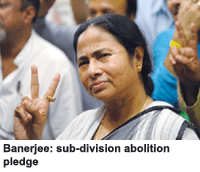All 176,488 primary-secondary schoolteachers in West Bengal are enjoying the bonanza of a paid summer holiday between April 18-May 13 — the period during which the state’s six-phase legislative assembly election is being conducted. The state government has declared all schools closed for this period to facilitate election logistics. However the anticipated whoops of joy from tens of thousands of school children for this bonus holiday are conspicuously muted. This is because schoolteachers and children know the time lost will have to be made up with extra teaching and learning given that the syllabus laid down by the West Bengal Board for Secondary Education (WBBSE) must be fully covered before the end of the academic year in May.
Senior and retired teachers temporarily roped in by WBBSE to help it discharge expected additional work, are particularly worried. They know all too well that after 34 years of uninterrupted rule of the Communist Party of India-Marxist (CPM)-led Left Front government in the state, the school system across the board in West Bengal (pop. 91 million) is a mess. “Nominally, teachers’ appoint-ments are meant to be impartially made on merit by the School Service Commission,” explains a senior teacher who insisted upon anonymity. “But this commission is a state government body and it is not a secret that all state organisations are packed with CPM members and apparatchiks. As a result unqualified schoolteachers have been recruited from party cadres in tens of thousands over the past 34 years. They have neither the will nor capability to make up the classroom time lost because of the assembly elections.”
 Educationists in West Bengal are almost unanimous that during the 34-year uninterrupted Left Front rule, education standards in the state have plunged precipitously. Shockingly once reputed as India’s most educationally advanced state which nurtured eminent education reformers such as Raja Ram Mohan Roy and Nobel literature laureate Rabindranath Tagore, West Bengal is ranked 32, above only Arunachal Pradesh, Jharkhand and Bihar, in the Education Development Index (2008-09) of the Delhi-based National University of Educational Planning and Adminis-tration (NUEPA) which tracks the progress of India’s 28 states and seven Union territories towards the goal of universal primary education.
Educationists in West Bengal are almost unanimous that during the 34-year uninterrupted Left Front rule, education standards in the state have plunged precipitously. Shockingly once reputed as India’s most educationally advanced state which nurtured eminent education reformers such as Raja Ram Mohan Roy and Nobel literature laureate Rabindranath Tagore, West Bengal is ranked 32, above only Arunachal Pradesh, Jharkhand and Bihar, in the Education Development Index (2008-09) of the Delhi-based National University of Educational Planning and Adminis-tration (NUEPA) which tracks the progress of India’s 28 states and seven Union territories towards the goal of universal primary education.
The beleaguered academic community in the state is inclined to derive some comfort from Trinamool Congress (TMC) chief Mamata Banerjee, widely tipped to end communist rule in West Bengal shortly, being somewhat aware of the on-ground situation. “There is a crisis in education in West Bengal. WB is ranked 32nd among the 28 states and seven Union territories of India with an Educational Development Index (EDI) value of 0.494. Moreover the state’s (primary) dropout rate is seventh highest in the country and higher than the national average dropout rate,” says the TMC manifesto.
Prof. amal mukhopadhyaya, former principal of Kolkata’s Presidency College, believes that a TMC victory will be good for education in West Bengal. “For thousands of academics who have been harassed and crushed by the CPM-dominated Left Front for 34 years, removal of the Left Front government will be a happy event. We expect an honest and transparent new government in which education officers are non-party individuals and academic decisions are taken on merit. This is what Mamata has promised in the TMC manifesto and one hopes she will keep her promises.” says Mukhopadhyaya.
Confident of victory, Banerjee has already made an important announce-ment to streamline education administration in the state. In 1977, the Left Front government had divided the department of education into six splinters, viz primary education, higher education, school education, technical education and mass education, and the department of libraries, with the intent of creating new seats of power for loyal party henchmen and bureaucrats. If elected to office, Banerjee has pledged to abolish all six sub-divisions and replace them with one education department — as indeed it was from 1947 to 1977 — headed by a respected apolitical educationist as minister.
Sujoy Gupta (Kolkata)